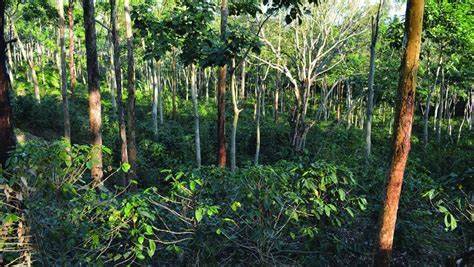
TANZANIA has the potential of transforming its economy and become a leading nation in Africa if will properly implement agroforestry programme.

Minister of State, Vice-President’ Office (Union and Environment), Dr Selemani Jafo said that agroforestry is a key tool for both climate change mitigation and adaptation, as trees help store large amount of carbon.
He made the remarks during the launch of the second phase of carbon farming project in Muleba District, Kagera Region recently during which he handed over 700m/- to 535 farmers registered by Karagwe Development and Relief Services (KADERES), a non-governmental organisation located in Karagwe District.
“Agroforestry is a key tool for both climate change mitigation and adaptation, as trees help to store large amounts of carbon. Tanzania envisions that four million households will have adopted and benefited from agroforestry by 2025 and has committed to restore 5.2 million hectares of degraded land by 2030,” he said.
Elaborating, he said agroforestry is one of the landscape restoration technologies envisioned in the country’s programmes.
Mr Jafo explained that Tanzania has a challenge of revitalising her agricultural sector by improving the natural resource base including soil, water and biodiversity.
He commended KADERES Peasants Development Public Limited Co (KDP Plc) Managing Director (MD), Mr Leonard Kachebonaho for implementing the agroforestry programme where many farmers have improved their livelihoods.
“I am made to understand that KADERES has planned to register over 10 million farmers across the country by 2030, including expanding the programme to other regions including Njombe, Kigoma, Songwe, Mbeya, Iringa and Ruvuma. My appeal is that you also include Lindi, Mtwara and Coast regions,” he said.
Minister Jafo explained that over the years, deforestation due to charcoal production and expanding agriculture, poor farming practices, overgrasing and food insecurity have become some of the critical challenges facing the country.
Tanzania has a population of over 60 million people, with about two thirds making a living in the agricultural sector.
He said Tanzania has already formed regulations for carbon farming, adding that about 20 companies have already been registered for carbon trading.
He appealed to graduates from various higher learning institutions, including the Sokoine University of Agriculture (SUA), to utilise their knowledge by engaging in carbon farming.
“The window is now quite open for graduates to become millionaires….do not waste the opportunity by seeking employment. Contact your nearest council to get land and utilise your knowledge by engaging in carbon farming. The adoption of these agricultural innovations, which are generally low-cost, improve livelihoods and also minimise negative environmental impacts, should be promoted,” he said.
KADERES Peasants Development Public Limited Co (KDP Plc) has made timely intervention by introducing carbon farming, a financial incentive for combating effects of climate change in their plantations.
Despite being endowed with arable land and conducive climate for supporting production of numerous crops, farmers in Kagera and others in the country have been failing to realise bumper harvest due to severe effects of climate change.
These effects include prolonged drought spells, soil erosion and soil infertility together with washing away of soil humidity.
___
Source here
